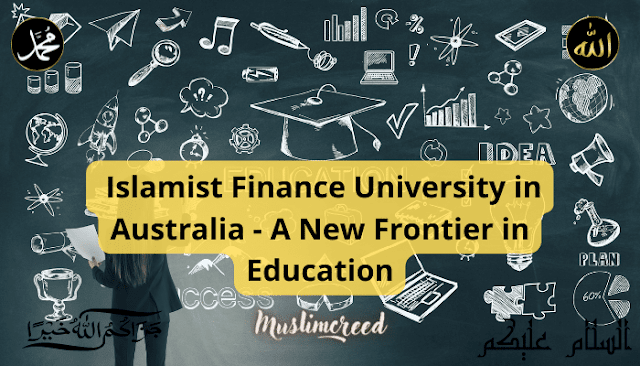Muslimcreed – Did you know that Australia hosts the first Muslim University in the world? It’s true! The Federation of Islamic (FIA) recently announced the opening of the first-of-its-kind university in Sydney. This development builds on Australia’s recent infrastructure improvements, which include special prayer rooms, halal meals, and even parking spots to accommodate Muslim worshippers.
What is Islamist Finance?
Islamist finance is a relatively new industry that has grown rapidly over the last decade. Islamist financing is concerned with creating a system of finance that operates within the framework of Islamic law, or Shariah. This means that there are different rules and restrictions for lenders and borrowers than those found in conventional (or Western) banking systems.
The Muslim population is projected to be about 25% of the world’s population by 2025, and as this population grows, so does their need for financial services and products. This has created a huge opportunity for Islamist bankers to make banking more accessible to Muslims everywhere. But how do these banks work? What are the benefits? And what sort of restrictions will you face if you choose to go down this route?
There are several types of Islamic banking products, including: Hibah (or Gift), Murabaha, Musharaka, Ijara and Salam. Each product has its own set of rules that govern lending and borrowing. Islamist finance also includes a unique approach to risk management called ‘Pure Premium Financing’ which is based around short-term contracts.
One more time?
The Need for an Islamic Finance University
Islamic finance is a growing industry and has been for the last few decades. The number of Muslim-owned businesses has risen from 2.6 million to more than 6 million since 2002, and Islam’s share of world trade has doubled from 3% to 6%. With Islamic finance’s exponential growth and expansion, there is need for an Islamic finance university that can cater to this demand.
Some universities offer courses on Islamic banking or finance but they are not dedicated solely to the study of this topic. Courses are usually offered as electives within a variety of disciplines or as part of a specialization program on topics such as international business or entrepreneurship. Universities with substantial resources can offer these courses as standalone subjects but many universities do not have the capacity.
What do you get from Islamic finance university? What makes it different from other financial programs? In addition to accounting, marketing, leadership and other business management courses, students will be able to study sharia-compliant banking and finance. When you attend an Islamic finance university, you’ll gain valuable insight into international compliance laws. You’ll also become familiar with financing opportunities offered through banks and investment houses that adhere to these laws.
The courses offered
The coursework offers a degree that has been designed to provide you with the skills and knowledge needed to succeed as an Islamic finance professional. With our courses, you will learn all about the principles of Islamic law that underpin the industry, and gain a deep understanding of the financial instruments available for use in Islamic finance. You will also acquire critical thinking and problem-solving skills, which are essential for any professional working in any field. You can also choose from a range of electives on topics such as Investment Analysis, Auditing or Corporate Governance. These electives allow you to tailor your degree to suit your specific career goals.
You don’t have to be Muslim to attend this university!
read also : University Islamic Financial: The Best in the Business
The benefits of an Islamic Finance education
Islamic finance is an emerging field that has been gaining momentum and popularity over the past decade. The Australian government has recently announced its commitment to this field, pledging to invest $2 billion AUD to create a world-leading centre of excellence for Islamic finance, the Asia Pacific Centre of Islamic Banking and Economics.
The university will offer a range of education opportunities including undergraduate degrees, postgraduate degrees, executive education programmes and PhDs. It will also be hosting conferences on related topics in order to promote dialogue between academics and practitioners.
This initiative promises significant benefits for all stakeholders: students will gain access to world-class scholarship and research; Australian society will develop a deeper understanding of Islamic finance; graduates from the university may become future leaders in both academia as well as the industry.
The future of Islamic Finance
Islamic finance is a topic of increasing interest, with many individuals and institutions looking to develop the sector. The need for a dedicated university or institution is clear, as there are few places where Islamic finance can be studied at the tertiary level. The establishment of an Islamist Finance University in Australia would be welcomed by both students and professionals alike as it would provide them with a platform for research, innovation and education.
